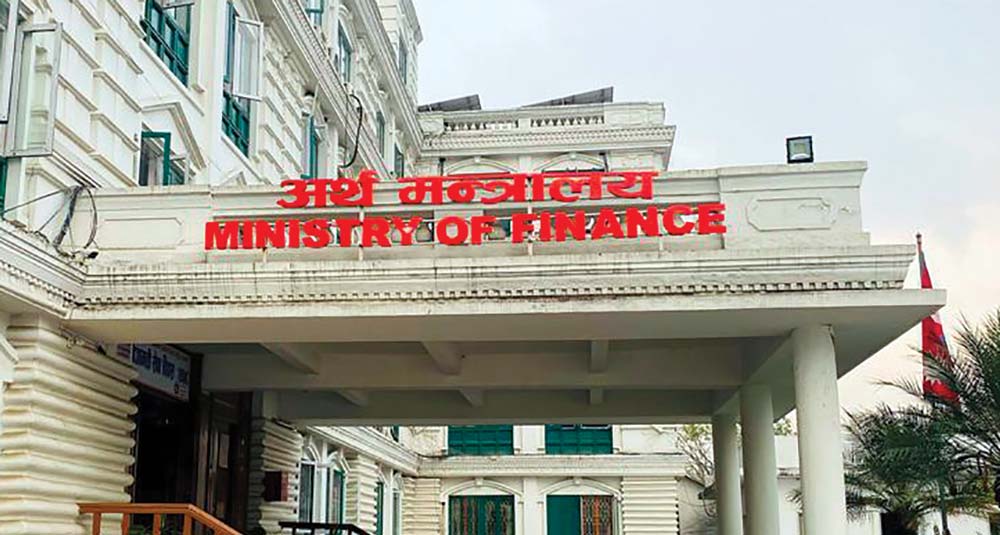- Friday, 9 January 2026
Finance Ministry proposes mechanism to mobilise climate finance
Kathmandu, Aug. 8: The Ministry of Finance (MoF) has released a comprehensive draft of the Climate Finance Mobilisation Procedure 2025, signalling a major policy push to access and manage international climate finance more efficiently.
The draft of the proposed procedure outlines a structured and transparent mechanism to prioritise, implement, and monitor climate-related projects both in public and private sector - across all three tiers of government as well as the private and non-governmental sectors.
With climate change posing an increasing threat to Nepal’s ecology and economy, the draft has accorded priority to compensation for loss and damage, climate adaptation, greenhouse gas emission reduction, and carbon trading.
These areas are aligned with Nepal’s national climate goals and international commitments under the Paris Agreement. The proposed procedure describes the process to identify and propose climate projects at the national level in order to bid them to the 'Climate Funds' that provide resources for climate-related activities under the United Nations Framework Convention on Climate Change (UNFCC), the Paris Agreement, and other international conventions and treaties related to climate.
"This includes supplementary climate-related funds established under these funds, as well as other bilateral and multilateral funds set up to provide resources for climate-related activities," read the draft.
Likewise, 'Climate Finance' refers to the financial assistance received from Nepal's climate funds, bilateral and multilateral climate finance partners, and any additional aid obtained from voluntary trade or other sources to support climate-related activities.
According to the draft, the MoF will act as the national focal point for climate finance mobilisation and will host a dedicated Climate Finance Unit under its International Economic Cooperation Coordination Division (IECCD).
This unit will be responsible for policy coordination, donor engagement, proposal app rovals, and maintaining a digital project monitoring system, read the draft.
To ensure coherence and accountability, the new procedure mandates alignment with the Constitution of Nepal, existing laws, foreign aid policy, national and local adaptation plans, Nepal’s Nationally Determined Contributions (NDCs), Sustainable Development Goals (SDGs), and sectoral plans and programmes.
Execution at sub-national level
The draft is the first of its kind policy in Nepal and outlines that projects can be implemented by government bodies at federal, provincial or local levels, as well as by private sector actors and NGOs. Implementing agencies will be required to coordinate with relevant ministries, ensure timely delivery, conduct regular monitoring, and submit periodic reports. They must also be able to arrange co-financing and assess both project outputs and impacts.
To ensure greater transparency, a centralised digital platform will be developed to provide real-time access to climate finance data. The platform will include a list of ongoing projects, priority project lists, concept notes, digital maps, and progress reports.
All implementing partners from public, private and non-government sector must update their information on the platform regularly.
To access the Climate Fund, only accredited or implementing entities may submit project proposals. These must first be included in a Project Priority List maintained by the MoF. Accredited institutions can submit concept notes at any time or respond to official calls issued periodically by the Ministry.
All submissions will undergo technical review and, if necessary, must be revised as per expert feedback.
To review the proposals and perform other relevant tasks, a technical committee will be formed in the coordination of the joint-secretary of the IECCE at the Finance Ministry. It will also include officials from the Budget Division of the MoF, National Planning Commission, Forests and Environment Ministry, Agriculture and Livestock Ministry, Federal Affairs and General Administration Ministry, Department of Hydrology and Meteorology, Nepal Rastra Bank and other invited experts.
Once the detailed project proposal is finalised and approved, the MoF will forward it to the climate funds. If approved by the Fund, a formal financial agreement and implementation contract will be signed between relevant parties.
Clear role for NGOs and private sector
In a notable move, the proposed policy has announced clear guidelines for NGOs and private sector participation in climate finance mobilisation. NGOs will be prioritised for projects in areas where government agencies or private investment are less effective or absent. Project locations must avoid duplication, and mapping will be conducted by the Social Welfare Council to ensure no overlap, it read.
Likewise, for the private sector projects, the MoF will coordinate with relevant line ministries and accredited institutions. However, the government will not provide sovereign guarantees for private sector loans. Instead, climate finance access will depend on the private entity’s financial health, credit rating, and experience in project implementation.
Projects must also be fully aligned with the climate-related objectives specified in their approved plans.
Mechanism proposed for Common Climate Fund
In order to avoid fragmentation and duplication of plans and projects, the draft procedures propose mobilisation through a Common Climate Fund. This fund will pool contributions from international donors, the Government of Nepal, and other partners. Such funds can also be disbursed as conditional grants to provincial and local governments or directly used for specific projects.
The allocation of funds will be guided by criteria such as local climate risks, past performance, and adaptation needs. A dedicated committee will be formed to assess and recommend fund distribution. The fund must be used exclusively for climate-related activities.
Chief of IECCD, Dhani Ram Sharma said that the draft is a crucial step towards establishing a systematic and transparent approach to accessing global climate finance.
"Since many organisations and subnational governments are still unaware about the requirement and process to apply to and compete for the climate fund. Many think that a mere recommendation from the Finance Ministry would ensure their access to the resources which is not so," he said.
Sharma maintained that it aims to strengthen institutional capacity, reduce duplication, and ensure equitable and effective use of funds in Nepal.






-original-thumb.jpg)






-original-thumb.jpg)



